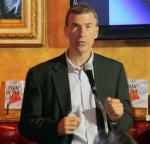 Chris DiCarlo: photo by Jay Diamond
Chris DiCarlo: photo by Jay Diamond
San Francisco-based skeptic group Reason4Reason (www.Reason4Reason.org) hosted a talk on August 13th by Dr. Christopher DiCarlo, promoted with the not-so-subtle moniker “How to Become a Really Good Pain in the Ass,” the title of DiCarlo’s latest book.
The talk was attended by several dozen eager skeptic-minded folks. Looking around the room, I couldn’t help but ask myself, “Are these people all here because they want to be a pain in the ass?” Although I doubt that was the case, it wouldn’t have mattered. The content of Dr. DiCarlo’s talk was better described by his book’s subtitle, “A Critical Thinker’s Guide to Asking the Right Questions.” In both the talk and the book, DiCarlo covered such topics as how to formulate strong, logical arguments (and how to recognize when they are flawed), a brief history of Socrates and his brilliant method of examining reality, as well as the definitions and importance of answering “The Big Five” questions (What can I know? Why am I here? What am I? How should I behave? and What is to come of me?).
Although the talk overall was interesting and informative, perhaps the most poignant (and sobering) lesson happened during the question and answer portion when DiCarlo told about the difficulties he endured in 2005 while teaching Critical Thinking at Wilfrid Laurier University in Waterloo, Ontario, Canada. DiCarlo had worn a T-shirt of his own design that read “We Are All Africans”, a reference to the scientific evidence that all humans migrated from Africa some 200,000 years ago, and spread out over the world. A young woman in the class who described herself as Aboriginal expressed her disagreement with this message in class, stating that her ancestors believed that her people had always been in North America.
DiCarlo described how he had engaged the young woman in a short, respectful discussion of the evidence for each theory, ending in an invitation for her to bring representatives from her side to class to have a discussion with scientists who would come at the invitation of DiCarlo, allowing the students to hear the evidence for both theories and weigh them accordingly. This student later filed a complaint with DiCarlo’s dean, culminating in a letter announcing the termination of his employment by the University. DiCarlo later won damages against the University in a grievance for wrongful termination. He has also been hired by a university that apparently respects the need for academic freedom, but this cautionary tale demonstrates yet another attempt to silence the voice of scientific evidence in response to complaints by those who hold cultural, religious, or political views that oppose the findings. DiCarlo’s story also emphasizes the need for each of us to become “a really good pain in the ass,” in the effective manner described in his book.
Sheldon W. Helms, associate professor of psychology at Ohlone College in Fremont, CA is a dues-paying member of the Bay Area Skeptics, and serves on its Board of Directors.
